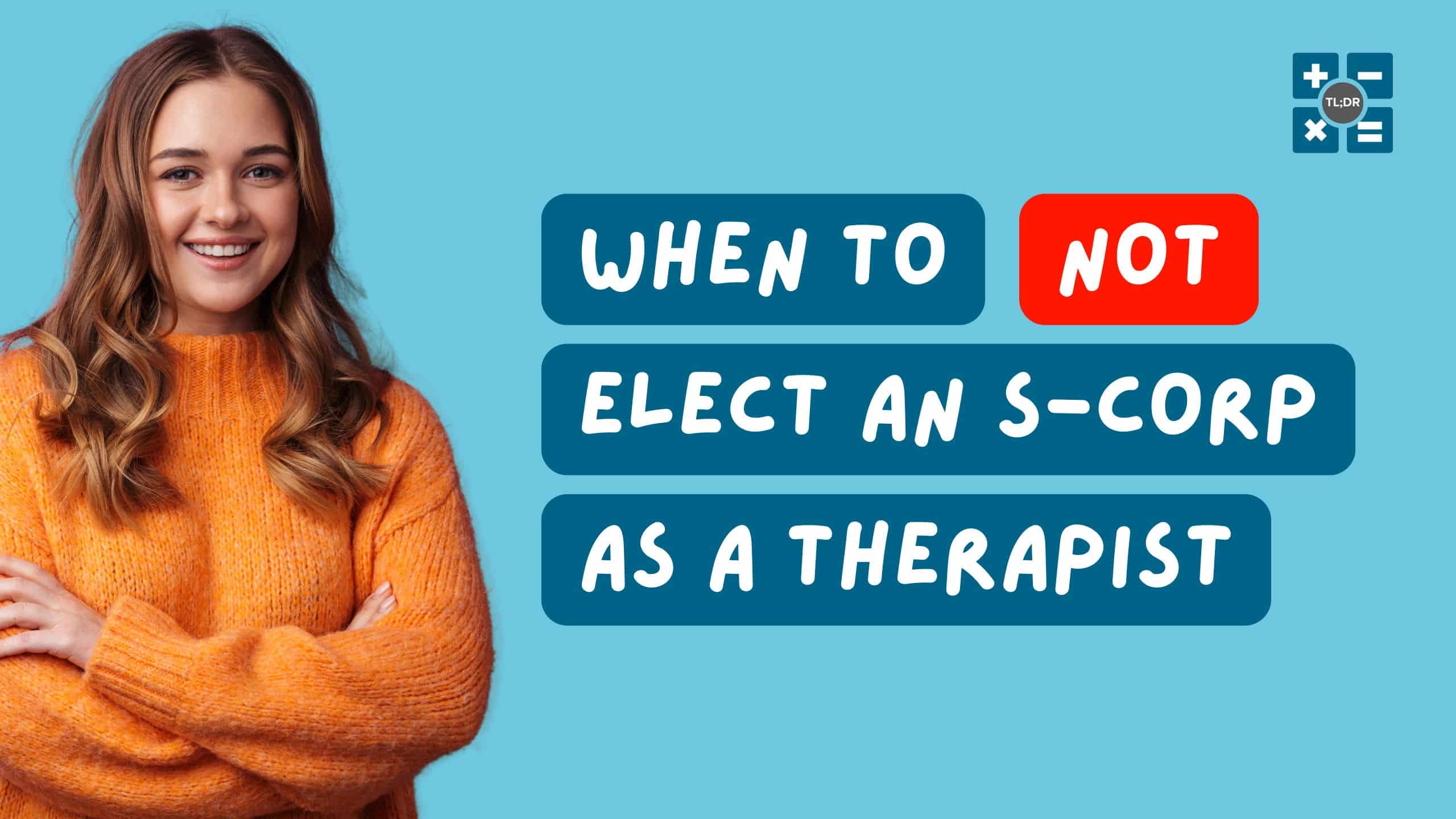Yes, you read that right. This isn’t your typical article on S Corps. Why? Because everyone seemed to be caught up in the hype over S Corp status when the Tax Cuts and Jobs Act was signed into law. Since it started gaining traction a few years back because of the added benefits and tax savings, the advice was always, “Go for the S Corp.” But now that we’ve had time to see how it plays out, some folks are beginning to second-guess their decision.
If you’re still on the fence about which direction to take, this article lays out the less-talked-about downsides of S Corps, giving you a clear picture of what you might be signing up for. Let’s dive into why S Corp status might not be the best choice for your therapy practice.
Burden of Management
Managing an S Corp can be a headache, especially if you’re running a small therapy practice. We’re talking official meetings, keeping board minutes, and sticking to strict rules that can feel out of place when it’s just you or a small team. All that extra red tape can distract your focus from what matters—helping your clients.
Plus, those formalities aren’t just a hassle; they can get expensive, too, with additional legal and accounting help costs. An LLC or sole proprietorship might be a better fit if you want to stay nimble and make quick decisions without jumping through hoops. They let you roll with the punches and adapt as your practice grows without the heavy lifting of all that S Corp paperwork.
Possibility of Small Profits
So many people fell in love with S Corps because they’re set up as “pass-through entities.” Nobody likes the double taxation that comes with the C Corps. Here’s how that works: first, the C Corp’s net income gets taxed at the corporate level. What’s left is the net income, and when some of that gets distributed as dividends, here’s the catch—those dividends get taxed again on your return.
Sure, the S Corps avoids double taxation, but they come with strings attached, such as the requirement to pay yourself a salary. While there’s nothing inherently wrong with drawing a salary, it can be a tight squeeze if your therapy practice isn’t bringing in much revenue in a given month.
For example, if you set your salary at $8,000 a month but your practice’s net income before that salary is only $9,000, you’re left with just $1,000 in net income. That hit can squeeze your cash flow and impact your practice’s profitability.
No Option for Reinvestment
C Corps might generate significant earnings, but shareholders don’t get immediate access to that money. Typically, only a portion of the profits is declared as dividends, while the rest is reinvested into the business. This setup helps C Corps grow faster by using those funds to expand. S Corps, on the other hand, doesn’t have that same reinvestment flexibility.
In an S Corp, any profits your therapy practice earns flow directly to you. You can’t simply decide to keep those earnings in the business as retained earnings—that option is only available to C Corps. This forced income distribution can make it challenging for your therapy practice to reinvest and grow since all profits must be passed to the owners.
And if you think you can bypass taking those profits, think again. The IRS expects to see that income reflected on your personal tax return, and if it’s missing, you could face some serious issues.
Not Investor-Friendly
S Corps is capped at 100 shareholders, which might initially sound like plenty. But when planning for serious expansion, that number can feel limiting. Raising capital often means bringing in new investors, and you could quickly find yourself at 99 shareholders without hitting your funding goals.
Choosing a C Corp can be a better choice if you plan to expand soon. C Corps can bring in unlimited shareholders, which gives you more space to bring in new capital for your expansion plans. Hence, if future expansion is already on the table for your long term goals, you could become a C Corp as early as now.
Strict IRS Oversight
S Corps has special perks like pass-through taxation, but these benefits come with strings attached. The IRS closely monitors S Corps to ensure that no one takes advantage of these tax breaks in ways that could shortchange the government. It’s like a quid pro quo situation with the government. They give S Corps special tax breaks, but S Corps should comply with the requirements strictly, especially in paying the owner a reasonable salary.
If you’re caught underpaying yourself or misreporting income, your therapy practice could quickly be under the IRS microscope. It’s a reminder that while S Corp benefits can be valuable, they come with a responsibility to stay compliant and honest in your tax reporting.
Still Undecided? Let’s Talk About It
This article isn’t here to scare you away from choosing an S Corp. Like anything, S Corps have their pros and cons, and we’re just laying out the downsides so you get the whole picture. It’s all about knowing both sides of the story.
Are you still feeling a little “huh?” about it all? That’s where TL;DR Accounting comes in. We specialize in helping therapists and therapy practices with accounting and tax-related, so you can focus on what you do best while we handle the rest.
Interested? Book a quick call with us now for more information and to see how we can help!





